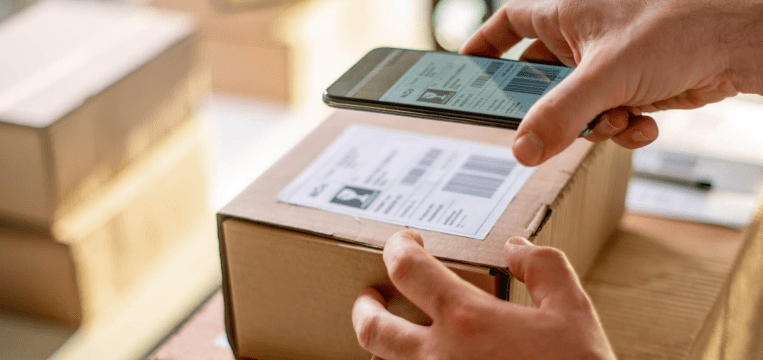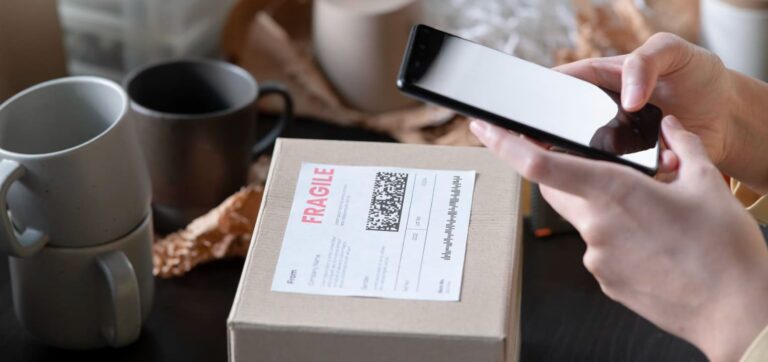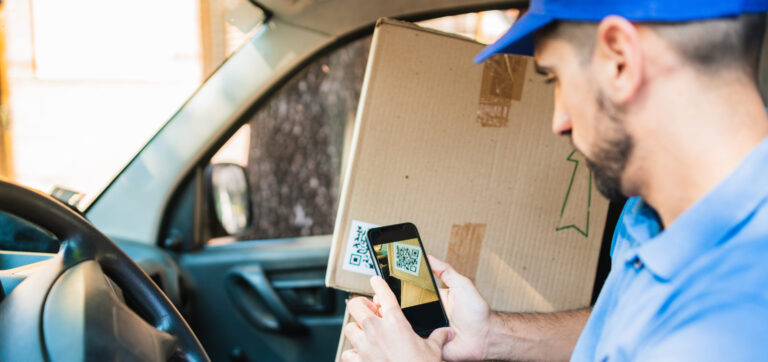Global parcel shipping volume is expected to reach 256 billion units by 2027. Handling the exploding demand for parcel shipping calls for innovative strategies and the latest technology. Especially during peak demand, postal services must be able to rapidly adjust to the increased workload.
In the past, the standard approach was to use conventional handheld scanning devices to scan shipping labels. Yet these dedicated handheld scanners have numerous downsides: They are costly to buy, operate, and maintain – and offer little flexibility.
Smartphone-based parcel scanning offers the perfect solution.
Traditional scanners struggle with shipping labels
Shipping labels have it tough: Low-quality label printers leave them blurry or smudged, rough handling of parcels in warehouses tears and dents them, and low lighting in delivery trucks makes them hard to read. All too often, these factors render shipping label barcodes unrecognizable to traditional barcode scanners.
However, speed is key on the last mile, even more so during peak times. Staff and delivery drivers need high-quality equipment that can handle workloads without disruptions. Only this way can they ensure that customers receive the fast service they expect. This is even more important during peak seasons like around Black Friday or the holiday season.
The perfect delivery process – smartphones bring efficiency at low costs
To handle peak demand, shipping companies hire seasonal workers who then need to be onboarded as fast as possible. However, acquiring handheld scanning devices and training inexperienced workers to use them takes time.
“Bring your own device” (BYOD) and “choose your own device” (CYOD) solutions are key to more efficiency. Enabling employees to use their own devices maximizes flexibility while minimizing operational costs and training. Every seasonal worker will use a familiar tool: their smartphone. They simply install the company’s mobile app with an integrated Barcode Scanner SDK – and have a fast, user-friendly, and accurate label scanner in their hands. Permanent delivery drivers and warehouse workers profit from their ease of usage and versatility as well.
With a mobile scanning solution, enterprises can effortlessly combine efficiency, employee satisfaction, and profitability!
Benefits of using a smartphone-based shipping label scanner
Thanks to advanced digital image processing technology, mobile barcode scanners are far more accurate than laser scanners. They deliver reliable results even with damaged barcodes and in difficult environments.
Using smartphone shipping label scanners has several other advantages over traditional handhelds.
Cost savings
Companies can opt for budget smartphones instead of expensive hardware scanners. Since virtually everyone knows how to use a smartphone, no training is required.
Costs can be reduced further with the BYOD approach: Employees just install the company’s internal app on their devices and are good to go. This approach is especially well-suited for quickly onboarding temporary workers.
Portability
Smartphones are much smaller and lighter than traditional handheld scanners. They fit into every pocket, are easier to carry around all day, and free up the parcel carrier’s hands.
They can even be worn around the neck or slung across the shoulder without causing strain. A rugged case protects them from impact and fall damage.
Ease of integration
Smartphones running iOS or Android offer a variety of ways for apps to interface with other software. This makes them perfect for communicating with complex backend systems. Integrating an SDK into a mobile app can be done in less than a week.
Versatility
Smartphones can fulfill many different roles at once. In addition to scanning barcodes, they can be used for age and identity verification, fleet management, scanning and uploading receipts, and more.
Accuracy
In real life, scanning conditions are not always ideal. Bad lighting, poor angles, or damaged barcodes pose a serious challenge to traditional barcode scanners. Enhanced with the Scanbot SDK, smartphones can read barcodes in challenging conditions due to their superior image-processing capabilities.
Extensibility
A software-based solution is ever-evolving. Using a regularly updated barcode scanning SDK means you will benefit from even better accuracy and performance as the technology is refined further.
How to turn smartphones into shipping label scanners
By integrating the Scanbot Barcode Scanner SDK into your mobile or web app, you can quickly provide all workers with tools for scanning barcode labels.
The SDK’s features were developed with real-world operations in mind:
- With Batch Scanning, you can read several barcodes consecutively without starting a new scanning process, perfect for loading a truck without interruption.
- Find & Pick helps workers find the right package in a jam-packed truck by highlighting pre-defined barcode values in the live view.
- Multi Scanning allows capturing several barcodes at once, speeding up workflows.
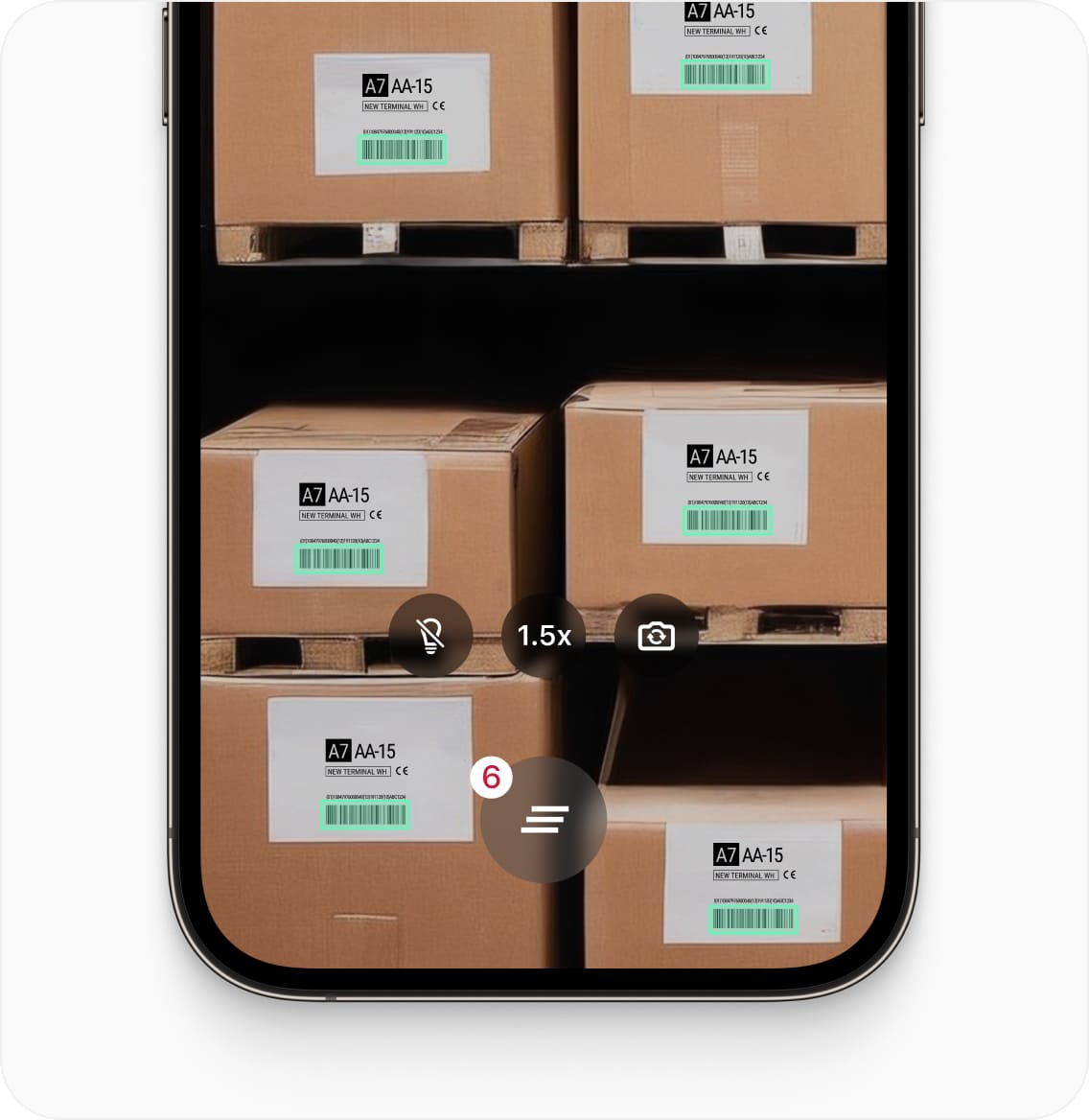
Thanks to the SDK’s Ready-to-Use UI Components, you can set up a fully functional shipping label scanner with a Find & Pick mode in just a few lines of code – even in a single, self-contained HTML file, thanks to the Scanbot Web Barcode Scanner SDK. Take a look:
<!DOCTYPE html>
<html lang="en">
<head>
<meta charset="UTF-8" />
<meta name="viewport" content="width=device-width, initial-scale=1.0, maximum-scale=1.0, user-scalable=0" />
<title>Find & Pick Shipping Label Scanner</title>
</head>
<body style="margin: 0">
<button id="scan-barcode">Scan barcode</button>
<script type="module">
import "https://cdn.jsdelivr.net/npm/scanbot-web-sdk@7.0.0/bundle/ScanbotSDK.ui2.min.js";
const sdk = await ScanbotSDK.initialize({
enginePath:
"https://cdn.jsdelivr.net/npm/scanbot-web-sdk@7.0.0/bundle/bin/barcode-scanner/",
});
document
.getElementById("scan-barcode")
.addEventListener("click", async () => {
const config =
new ScanbotSDK.UI.Config.BarcodeScannerScreenConfiguration();
const useCase =
new ScanbotSDK.UI.Config.FindAndPickScanningMode();
useCase.sheet.collapsedVisibleHeight = "LARGE";
useCase.sheetContent.barcodeItemImageVisible = false;
useCase.expectedBarcodes = [
{ barcodeValue: "A98765", title: "A98765, Scanbot SDK GmbH", count: 1 },
{ barcodeValue: "C23456", title: "C23456, Scanbot SDK GmbH", count: 1 },
];
config.useCase = useCase;
const scanResult = await ScanbotSDK.UI.createBarcodeScanner(config);
if (scanResult?.items?.length > 0) {
console.log(scanResult);
} else {
console.log("Scanning process canceled");
}
});
</script>
</body>
</html>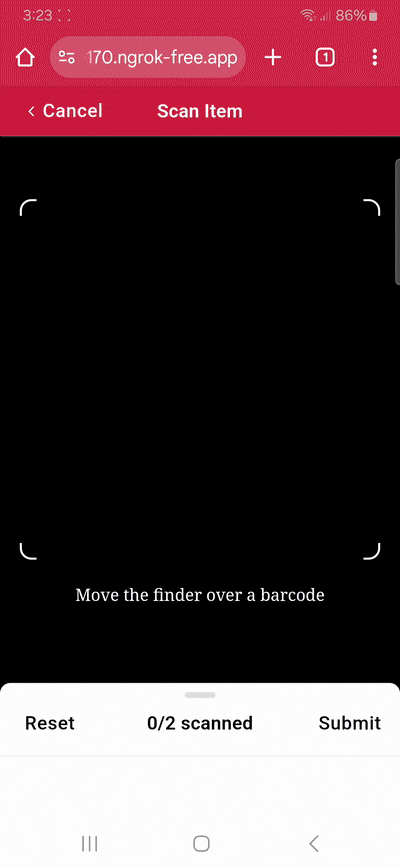
Feel free to copy the code into an HTML file, replace the expectedBarcodes values, and run the app on your development server. When moving to production, we recommend you download the SDK and host it on your server instead of using a CDN.
The Scanbot Barcode Scanner SDK reliably scans all barcodes commonly used on shipping labels, such as Code 128, GS1-128, Intelligent Mail barcode (IMb), Data Matrix, and RM4SCC, even when damaged, blurry, tiny, or far away. High-speed scanning helps take shipping-related operations to the next level.
Experience the SDK’s features in our free Barcode Scanner demo app or integrate the SDK into your app with our free 7-day trial license.
Beyond barcodes: The Scanbot SDK turns smartphones into all-in-one scanning solutions
Using smartphones instead of dedicated hardware scanners lets you use a single device for different scanning use cases.
Data Capture Software extracts all relevant information from driver’s licenses and ID cards, which speeds up employee onboarding and streamlines fleet management.
With a high-quality Document Scanner SDK, drivers can capture paperwork on the go and quickly send it to the back office for processing. An intuitive interface guarantees that every submitted scan is sharp and clear.
Learn more about how Lynden, a U.S. freight logistics expert, increased driver productivity with streamlined freight document scanning – or discover what other satisfied customers say about Scanbot SDK.
FAQ
How can implementing Scanbot SDK optimize workflows in logistics or shipping operations?
Scanbot SDK streamlines logistics operations by automating the scanning and data extraction from shipping labels. This reduces manual data entry, minimizes errors, and speeds up the process. Integrating this technology allows for faster processing and more efficient handling of shipments, improving overall productivity and accuracy.
What are the business benefits of adopting a mobile device-based scanning system for label processing?
A mobile device-based system offers flexibility, reducing the need for dedicated hardware. Employees can scan labels anywhere, increasing mobility and convenience. It also cuts down on the upfront cost of purchasing specialized devices, while enabling real-time data syncing and faster workflow integration.
What features in Scanbot SDK help with scanning labels that are damaged or poorly printed?
Scanbot SDK is designed to handle challenging label conditions, such as poor printing quality or damage. Its advanced image processing algorithms enhance image clarity and improve the recognition accuracy of barcodes, even when labels are partially damaged or faded, ensuring reliable scans in all conditions.
